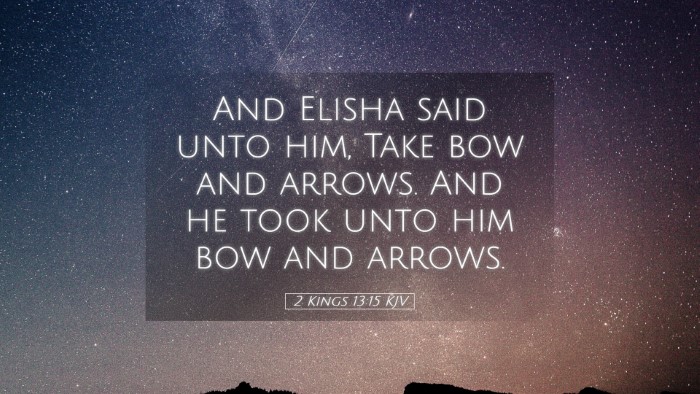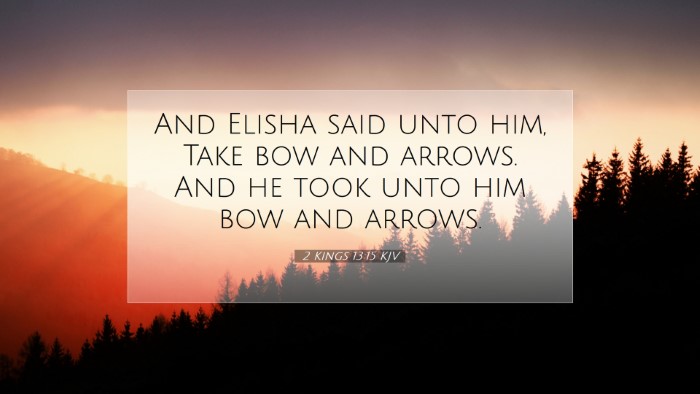Commentary on 2 Kings 13:15
Verse: "And Elisha said unto him, Take bow and arrows. And he took unto him a bow and arrows."
Contextual Background
The narrative of 2 Kings 13:15 occurs during a critical time in the history of Israel, amidst the decline of the northern kingdom. Elisha, the prophet, is nearing the end of his life, and the nation is facing threats from powerful enemies, particularly the Arameans. In this context, the prophetic ministry holds significant weight in determining Israel's fate.
Commentary Insights
Matthew Henry's Commentary
Matthew Henry emphasizes the urgent need for spiritual leaders to be present in times of national crisis. He notes that Elisha's instructions to the king symbolize the divine guidance that is essential in warfare and conflicts. The act of taking a bow and arrows highlights the necessity of preparation and readiness to confront adversaries.
- Symbolism of Bow and Arrows: The bow represents strength and divine assistance, while the arrows symbolize the specific enemies and the targeted efforts required to overcome them.
- Prophetic Instruction: Elisha's command reinforces the idea that God's guidance is necessary for victory, reminding leaders that their strategies must align with divine will.
Albert Barnes' Commentary
Albert Barnes provides a practical interpretation of this event, suggesting that Elisha’s actions teach critical lessons about faith and obedience. The gathering of the bow and arrows represents both preparation and an invocation of faith to act upon God’s promises.
- Call to Action: By instructing the king to take action, Elisha invokes the principle that God often works through the faithful willingness of His servants.
- Obedience in the Face of Need: The need for decisive action in moments of despair indicates that the faithful are to trust in God and His provision for their battles.
Adam Clarke's Commentary
Adam Clarke delves into the significance of Elisha's role as a prophetic figure with immense authority. He notes that this command was not merely for physical warfare but had deeper spiritual implications that pertain to Israel's covenant relationship with God.
- Intercession: Clarke highlights Elisha’s position as intercessor, emphasizing how the success of the king’s endeavors depended upon aligning with God’s purpose.
- Covenant Relationship: The act of taking weapons symbolizes the broader theme of God’s people engaging in the spiritual battles of life, always relying on His guidance and promises.
Theological Implications
This verse carries profound theological significance, particularly concerning the relationship between God's providence and human effort. The preparation of the bow and arrows signifies an active faith, while the obedience to divine instruction indicates trust in God’s overarching plan.
Faith and Action
Believers are called to partner with God in their endeavors. Just as the king was instructed to take specific action, so too are Christians today encouraged to engage in their battles, equipped with faith and obedience. The understanding that God empowers our efforts is central to a faithful life.
Prophetic Guidance
The role of prophets in guiding leaders is underscored here. Elisha is not merely a passive observer but a crucial participant in directing the king towards victory. This highlights the importance of spiritual leadership and listening to God’s voice through prayer and godly counsel.
Practical Applications
- Preparation for Challenges: Just as the king was called to prepare his instruments for battle, pastors and leaders must be ready to equip themselves and their congregations spiritually.
- Seeking God’s Guidance: The need for divine direction in decision-making is paramount. Engaging in prayerful consideration can lead to greater clarity in leadership.
- The Importance of Faithfulness: Acts of obedience, often in the face of adversity, invite God’s intervention and power in our lives.
Conclusion
2 Kings 13:15 encapsulates a moment of divine instruction that resonates across generations. It speaks to the contemporary believer about the necessity of combining faith with action, the pursuit of God's guidance in leadership, and the understanding that our battles are indeed fought with the instruments of faith. Through the insights of Matthew Henry, Albert Barnes, and Adam Clarke, we grasp the enduring truth that God equips and empowers those who trust in Him.


